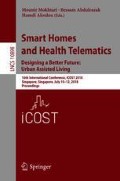Abstract
The overall objectives of this research were to assess the functionality of iris scanning technology in a community setting and to evaluate the acceptability to shelter clients of using iris scanning as a form of identification. In order to assess the feasibility of implementing iris scanners in a shelter setting, the research team documented the number of people who agreed to be scanned, the number of people who declined, and the number of successful scans completed. The research team collected 200 scans over the course of 3 visits. A second iris scan was requested of 50 individuals to allow the research team to assess whether the technology accurately identifies someone over a period of time. The results indicate that most people found the technology acceptable, and that the number identifier was consistent over repeated scans.
Access this chapter
Tax calculation will be finalised at checkout
Purchases are for personal use only
References
Gaetz, S., Dej, E., Richter, T., Redman, M.: The State of Homelessness in Canada 2016. Canadian Observatory on Homelessness Press, Toronto (2016)
Stark, L.R.: Barriers to health care for homeless people. In: Jahiel, R.I. (ed.) Homelessness: a Prevention-Oriented Approach. Johns Hopkins University Press, Baltimore (1992)
Hwang, S.W., Windrim, P.M., Svoboda, T.J., Sullivan, W.F.: Physician payment for the care of homeless people. CMAJ 163, 170–171 (2000)
Crowe, C., Hardill, K.: Nursing research and political change: the street health report. Can Nurse. 89, 21–24 (1993)
Martin, A.K., Donovan, K.P.: New surveillance technologies and their publics: a case of biometrics. Public Underst. Sci. 24, 842–857 (2015)
Moody, J.: Public perceptions of biometric devices: the effect of misinformation on acceptance and use. IISIT. 1, 753–761 (2004)
Latman, N.S., Herb, E.: A field study of the accuracy and reliability of a biometric iris recognition system. Sci. Justice 53, 98–102 (2013)
Jain, A.K., Ross, A., Prabhakar, S.: An introduction to biometric recognition. IEEE Trans. Circuits Syst. Video Technol. 14, 4–20 (2004)
Brown, C.L.: Health-care data protection and biometric authentication policies: comparative culture and technology acceptance in china and in the united states. Rev. Policy Res. 29, 141–159 (2012)
Acknowledgments
Would like to acknowledge the Salvation Army for facilitating the research environment. Also, we appreciate the commitment of the research assistants for data collection and auditing to make sure the quality of research is assured. Finally, we would like to thank the participants for their voluntary participation. We would also like to acknowledge the granting agency for making the funding available.
Author information
Authors and Affiliations
Corresponding author
Editor information
Editors and Affiliations
Ethics declarations
The authors declare no conflict of interest.
Rights and permissions
Copyright information
© 2018 Springer International Publishing AG, part of Springer Nature
About this paper
Cite this paper
Forchuk, C., Donelle, L., Capretz, M., Bukair, F., Kok, J. (2018). Evaluating Iris Scanning Technology to Link Data Related to Homelessness and Other Disadvantaged Populations with Mental Illness and Addiction. In: Mokhtari, M., Abdulrazak, B., Aloulou, H. (eds) Smart Homes and Health Telematics, Designing a Better Future: Urban Assisted Living. ICOST 2018. Lecture Notes in Computer Science(), vol 10898. Springer, Cham. https://doi.org/10.1007/978-3-319-94523-1_15
Download citation
DOI: https://doi.org/10.1007/978-3-319-94523-1_15
Published:
Publisher Name: Springer, Cham
Print ISBN: 978-3-319-94522-4
Online ISBN: 978-3-319-94523-1
eBook Packages: Computer ScienceComputer Science (R0)

